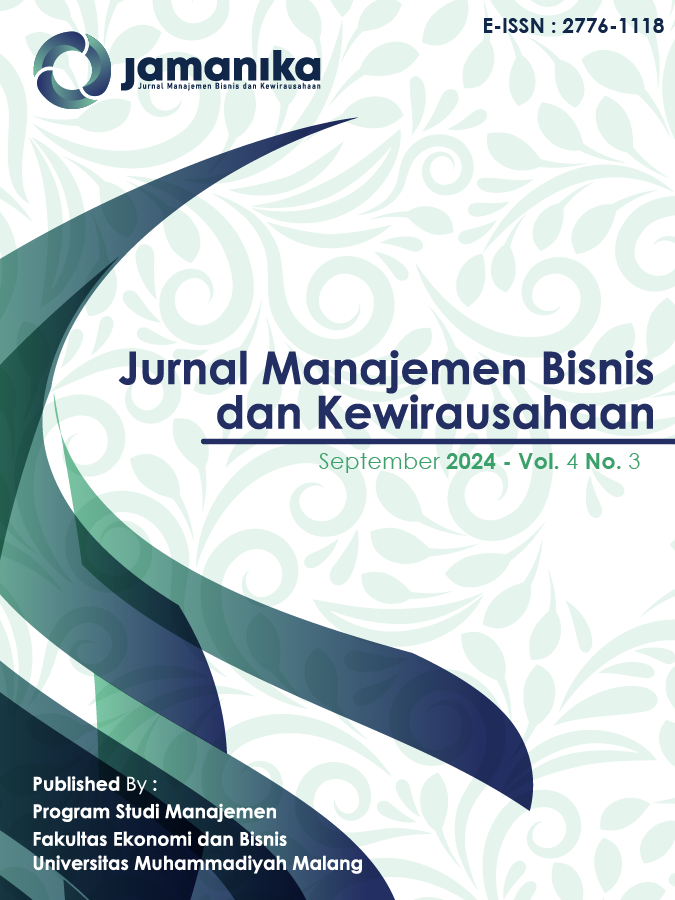The Effect Of Internship Experience On Job Readiness With Self-Efficacy As Moderation
DOI:
https://doi.org/10.22219/jamanika.v4i3.36129Keywords:
Internship experience, Job Readiness, Self-EfficacyAbstract
The purpose of this study is to identify and analyze apprenticeship experience, work readiness and self-efficacy, the effect of apprenticeship experience on work readiness, analyze apprenticeship experience on work readiness with self-efficacy as moderation. This type of research uses explanatory research with a quantitative approach. The population and sample in this study were all 2019 class management students who took part in the internship as many as 98 students. The sampling technique uses saturated or census sampling. Collecting data using a questionnaire technique (questionnaire) and interviews. Data analysis used simple regression analysis with SPSS 29 software. The results showed that apprenticeship experience was at a good level, job readiness was at a high level and self-efficacy showed a high level. There is a positive and significant influence between the effect of apprenticeship experience on work readiness, self-efficacy cannot moderate the effect of apprenticeship experience on work readiness.
Downloads
References
Afriyulaniza, A. (2019). The influence of industrial internship practices on the job readiness of Islamic Banking students, Faculty of Economics and Islamic Business, IAIN Bengkulu. Carbohydrate Polymers, 6(1), 5–10.
Agus, F. (2006). Uncertainty of entering the workforce due to education. Jakarta: Dineka Cipta.
Alwisol. (2010). Personality Psychology. UMMPress. https://books.google.co.id/books?id=ZuB0DwAAQBAJ
Baron, A.R, Byrne, D. (2004). Social Psychology. Jakarta: Erlangga.
Chaplin. J.P. (2002). A complete dictionary of psychology. Jakarta : PT. King Grafika Persada.
Chaplin. (2006). Complete Dictionary of Psychology (Kartini Kartono Translation). Jakarta: PT Raja Grafindo Persada.
Dahlan, Hasim, D., & Hamdan. (2017). The Influence of Human Resource Management and Organizational Culture on Service Quality at the Tamalate District Office, Makassar City. Jurnal Administrare, 4(2), 69–75.
Eliyani, C. (2018). The role of self-efficacy as a moderating variable of the influence of industrial work practice experience on job readiness. Independent Journal, 2(1), 23–41. https://doi.org/10.33753/mandiri.v2i1.30
Fajri, R. N. (2018). Planning, Implementing, Writing Internship Reports (Practical Guide for Students Who Will Welcome the World of Work Accompanied by Sample Internship Reports). Deepublish. https://books.google.co.id/books?id=609mDwAAQBAJ
Jhon M.Ivancevich,Robert Konopaske, M. T. M. (2006). Organizational Behavior and Management, 7th edition, vol. 1. Erlangga. https://books.google.co.id/books?id=uunajnum4cgC
Kasmir. (2016). Human Resource Management (Theory and Practice). Jakarta : Rajawali Press.
Kusnaeni, Y., & Martono, S. (2016). The influence of perceptions about fieldwork practices, information on the world of work and motivation to enter the world of work on student job readiness SMK. Economic Education Analysis Journal, 5(1), 16–29. http://journal.unnes.ac.id/sju/index.php/eeaj
Maftuhah, R., & Suratman, B. (2017). The influence of self-efficacy, family environment, and entrepreneurial knowledge on the entrepreneurial interest of vocational students in Sidoarjo. Journal of Educational Economics and Entrepreneurship, 3(2), 121. https://doi.org/10.26740/jepk.v3n2.p121-131
Makki, B. I., Salleh, R., Memon, M. A., & Harun, H. (2015). The relationship between work readiness skills, career self-efficacy and career exploration among engineering graduates: A proposed framework. Research Journal of Applied Sciences, Engineering and Technology, 10(9), 1007–1011. https://doi.org/10.19026/rjaset.10.1867
Rusidi. (2006). Research Methodology. Lecture Diktats. Bandung: PPS Unpad.
Slameto. (2015). Learning and Influencing Factors. Rineka Cipta.
Downloads
Published
Issue
Section
License
Copyright (c) 2024 Cicilia Dena Anggraeni Anggraeni, Siti Nurhasanah, Ratya Shafira Arifiani

This work is licensed under a Creative Commons Attribution-ShareAlike 4.0 International License.







